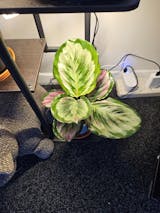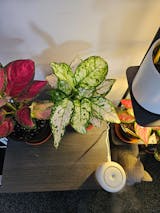So often I hear from customers who have had thriving plants, that seem to spectacularly sulk and barely survive, come the winter months. You may not like to hear this, but I'm going to tell you anyway, if you keep the same plant care regime from one season to the next, you're likely going to run into trouble and your plants will be the first to let you know.
I do want to reassure you though, that with a few minor adjustments, there is no reason why you can't have thriving plants that last many years, through many different seasons. Let's take a closer look on what your plants wish they could tell you.
Plant Watering
This is where I see plant parents making the most mistakes and unfortunately, your plants are not very forgiving if you don't get this part right. No matter what the season, you shouldn't be watering to a schedule, but watering to your individual plants needs. That's a whole blog in itself, but I can help simplify this point. I liken this to needing water after a workout. If we do a big gym workout, we need lots of water, if we are sedentary, we need less. Spring and summer is your plants "workout" time and autumn and winter, your plants are "sedentary."
If you water on a regime (e.g. every Saturday) and your plants are thriving, you've likely got lucky. A plants watering needs, is very dependent on the type of plant and also the amount of light a plant receives. Let me explain this. If you had exactly the same plant type and you had one in a room that receives less light, it will require water less often, than the same plant in a bright room.
Knowing this, you need to reduce your watering during the winter months. Why? Because there is less light. Even on a clear day, your room is likely not as bright as it is during the warmer months. You should be pretty safe if you let the soil completely dry out before rewatering during the winter months as the plant isn't growing, the light it's receiving is lower and therefore it needs far less. There are of course always exceptions to the rule, so let's now take a look at temperature.
(note - you can read more about plant watering in this blog).
Temperature
Most indoor plants prefer consistent temperatures and not large temperature fluctuations. Their ideal temperature range is somewhere around 12-24 degrees. During winter, the room your plants are in, can fluctuate greatly, cycling through cold (no heating) and hot (heating). Woodburners, heat pumps, and dehumidifiers can all change the amount of moisture in the air, which can make your humidity loving plants really suffer. These fluctuations can also stress your plants and they may struggle to adjust to these changes.

Heating also dries the air, so whilst I've recommended to reduce watering, you do also need to ensure that plants near heating sources, are monitored, as they may dry out more quickly. I'd be keeping a close eye on these plants, especially if they are humidity lovers (calathea, I'm looking at you look).
To repot or not to repot?
I have personally repotted plants during any time of year. However, I have made sure that the plant is in a healthy condition and reduced stressors to ensure an easy transplant. This is like surgery for your plant babies and you therefore want optimum conditions for it to not go into shock. A bit like when you might have an early night before a major operation.
Ideally, I recommend waiting until conditions improve. When it's warmer, brighter and the plant is actively growing. The stress of winter, plus a repot (major surgery), could be the end of your plant. If you're determined to do it, reduce stress as much as possible and ensure that only healthy foliage goes into the new pot.
To fertilise or not to fertilise?
Growth generally slows or halts completely (for some plants that go dormant), over winter. Fertiliser is a plant food that gives plants nutrients to support growth. For this reason, you want to be careful not to feed your plants when they're not actually needing these nutrients at this time. If you have a plant that is still growing, you can still give it some fertiliser, but I would give the plant a diluted amount if you do. If you give a plant more "food" than it needs, it may not respond kindly - a bit like when we eat too much and feel uncomfortable. Let's now look at what you can do.
My top tips to ace winter plant care
✔ Reduce watering and check the soil before giving your plants a drink. If the soil is still moist, it likely doesn't need any. Sometimes, a plant may not need water for 2-3 weeks over winter. This will depend of course, on your heating and the light it receives.
✔ Consider moving your plants to a brighter room, particularly your colourful and variegated plants - these need more light than others. Some morning sun is fine in winter and may actually be beneficial.
✔ Consider moving your plants to reduce temperature fluctuations. Move plants from rooms that could sit below 12 degrees. Also move your plants from drafts such as cold windows and doors that open and close. Be mindful how close your plants are to heating and reduce any impacts by considering moving them away from these sources. To increase humidity, group your plants together and consider using mist and feed 1-2 times per week, especially if your heating is drying the air.
✔ Reduce or completely stop fertilising your plants. You can give them something natural like Groconut to keep their growth healthy with no risk to over doing it. It's easy to over fertilise in winter.
✔ Dust.your.plants! I can't emphasise this enough. It really does make a difference. Your plant needs to photosynthesise to thrive, and they do this through their leaves. During winter, they are also having to do this with less light. If there's a layer of dust on your plants, you are just making it so much harder for your plant. I place my plants into my shower and give them a sprinkle with a low pressure shower head, when it's time for a water. They will love you for it!
I hope you have found this helpful. I'd love for you to leave a comment below to let me know, or to ask any questions that this may not have answered for you.
If you'd like these tips straight to your inbox so you never miss them, you can subscribe here.
If you've read this far, you're a committed plant parent, and I take my hat off to you. Thanks for reading.
Chontelle x





















6 comments
Thanks. I am usually green fingered but not of late and have killed a few plants and I realise it is overwatering because I do it on a set time each week. Thanks for enlightening me!!!
thank you i enjoyed reading this it is very helpful
I love allllll the info you give it’s detailed and easy to understand and jam packed with info I can come back to check I’m doing things right with all my babies 😍
i always read and save your emails as they are very handy and full of tips. thanks so much for sharing your wealth of knowledge.
This was great, thank you!
You're viewing 1-5 of 6